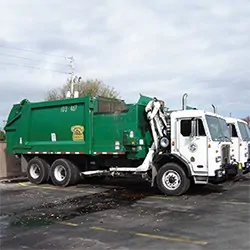

Are you getting the right rates? Are you certain?
SCS Management Services® can perform a solid waste rate study, and the result would help answer these questions. With the rising costs of providing solid waste collection services, it is more important than ever to track rate information and benchmarks closely. SCS Engineers provides services that make sense of current solid waste operations and existing rates while helping you develop a long-term financial model that can inform your decision-making process and financial considerations.
Ask us about the Top 10 Rate Study issues!
Cost of service and rate studies performed by SCS focus on the critical financial and management issues facing public works and solid waste agencies. Most importantly, a well-planned and detailed rate analysis can be used to measure the revenues needed to provide the desired levels of service, while also helping establish fair, equitable, stable, and defensible solid waste user rates.
A thorough analysis of existing operations will enable your department or agency to determine whether existing service levels, collection technologies, maintenance practices, fleet replacement strategies, financing, and/or work rules need to be re-examined. Our experienced rate analysts can provide useful guidance on how to benchmark your operations against similar operations, nationally or regionally.

Evaluating possible cost savings and revenue enhancements is a key function of a cost of service or rate study. Political decision-makers are increasingly asking public sector agencies to do more with less. Rather than reduce operating budgets by a flat across-the-board cut, another strategy is to look for real economies by relaxing outdated civil service rules or policies that increase an agency’s overall cost of operations. For example, many agencies are looking for creative ways to reduce fleet maintenance costs, such as requesting price concessions from their municipal fleet managers or directly outsourcing these services to private vendors on a bid basis.
Another area for possible cost savings is in recyclables collection. Many communities are finding single-stream recycling collection more economical than traditional curb-sort programs. Further, some municipalities are eliminating outdated personnel rules and redefining work policies to enable gain-sharing and pay-for-performance bonuses for work exceeding a set annual goal.
On the revenue side, some agencies are being empowered by their political decision-makers to function like private businesses looking for ways to expand their level of service and increase their revenue base. Possible strategies include providing collection services to neighboring jurisdictions at rates above those charged to agency customers; developing a commercial roll-off business; and soliciting advertising to be placed on solid waste collection vehicles.
The solid waste system rate study conducted by SCS Management Services™ includes the following major work elements:
Using various “what if” scenarios, we can quickly determine the overall impact of alternative customer rates on the long-term financial outlook of the solid waste system. Some of our rate models can seamlessly integrate factors into the rate model and allow powerful graphical representations of key financial indicators for decision-making.
Changes in levels of service and customer rates are traditionally subjects that politicians are not eager to discuss, particularly in election years. Nevertheless, all of the recent national surveys of public works suggest that these facilities have been historically underfunded. As a professional manager, you recognize the political realities in your community, but you also have a responsibility to the public to manage solid waste services in the most efficient and equitable manner, considering long-term funding needs for facility closure and post-closure care or fleet replacements.
A cost of service and rate study should be considered an essential tool in evaluating your agency’s costs, long-term funding needs, and alternative rate structures. The study results are a quantifiable method to communicate effectively to political decision-makers and the public the reasons for possible rate increases and to identify a sound strategy for managing your agency’s costs and revenues.